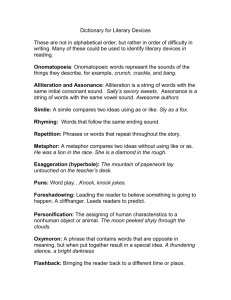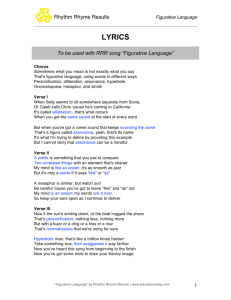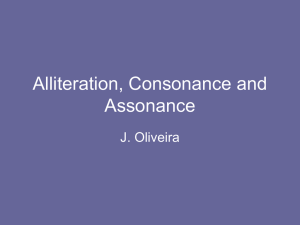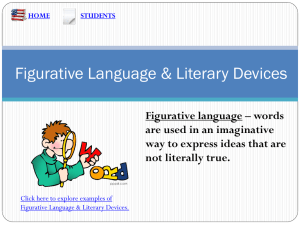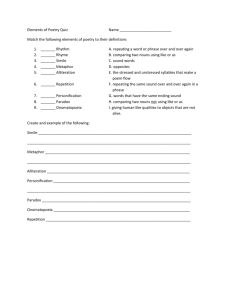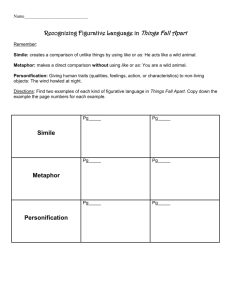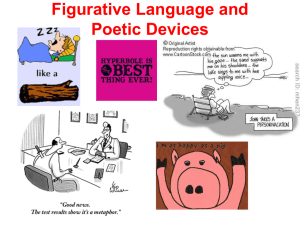Figurative Language
advertisement
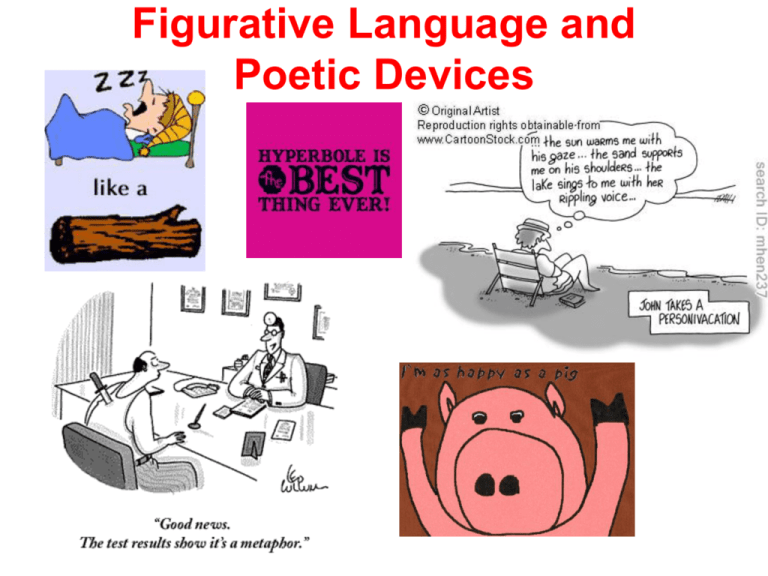
Figurative Language and Poetic Devices Figurative Language • Figurative language communicates ideas beyond the literal meaning of words. • FIGURATIVE: She left the room like a cheetah chasing its prey. • LITERAL MEANING/IDEA EXPRESSED: She left the room quickly. = • Writers use these tools to communicate descriptions and abstract ideas to the reader in a way that’s creative and, sometimes, even more truthful than literal language. You are the wind beneath my wings. • FIGURATIVE: Your support and friendship helps me in my life. • LITERAL: You are actually wind underneath my wings. Figurative Language • Figurative language communicates ideas beyond the literal meaning of words. FIGURATIVE After our fight at the mall, every time I saw my best friend I was walking on egg shells. • WHAT IS THE DECODED MEANING OF THIS SENTENCE? Figurative Language • However, what’s tricky for readers is that we must often decode the figurative language into literal language to understand the writer’s meaning. • In English III, beyond just identifying “that’s a metaphor” or “that’s personification”, we want to think about the writer’s purpose: • WHY did the writer use that particular figurative language or device? • WHAT IDEA is he or she trying to express? 1. SIMILE • used to compare two different things or ideas using like or as. His thoughts tumbled in his head, making and breaking alliances, like underpants in a dryer without Cling Free. A) What’s being compared in this simile? B) What’s the purpose? What idea is the writer expressing? 2. METAPHOR • a figure of speech which makes a direct or implied comparison (without like or as) between two things or ideas that are poles apart from each other but where the writer notices a shared characteristic between them All the world’s a stage, and all the men and women merely players… ~ William Shakespeare A) What’s being compared in this metaphor? B) What’s the purpose? What idea is the writer expressing? The difference between similes and metaphors • Simile: Ryan is as hungry as a bear. OR Ryan is like a hungry bear. • Metaphor: Ryan is a real bear when he gets hungry. IMPLIED METAPHOR is a metaphor that is not as obvious because it’s not explicitly stated using the verb “is” My Kentucky-fried skin was red after too many hours in the sun. = IMPLIED METAPHOR … is a metaphor that is not as obvious because it’s not explicitly stated using the verb “is” “Now is the time to lift our national policy from the quicksand of racial injustice to the solid rock of human dignity.” ~MLK, “Letter from a Birmingham Jail” A)What’s being compared in this metaphor? B)What’s the purpose? What idea is the writer expressing? IMPLIED METAPHOR Often a VERB is used to make an implied metaphor. She drove cruel rumors about me all over the school, denting and smashing my reputation to pieces. A)What’s being compared to what in this metaphor? B)What’s the purpose? What idea is the writer expressing? WEAK similes or metaphors… occur when we attempt to compare two things that are too similar or that belong to the same category. The dirty pond was like a polluted river. The old oak tree was the earth of our backyard. Her face was an oval of flesh. Dead or Clichéd Metaphors/Similes back against the wall the ball’s in your court as big as a house bite the bullet as busy as a bee cool as a cucumber to be on fire fit as a fiddle like a deer in the headlights go the extra mile heart of gold throw your hat in the ring turn over a new leaf light at the end of the tunnel to open a Pandora’s box as pure as snow ships that pass in the night a thorn in my side These figures of speech--and there are many more--are fine to use in every day conversation, but we want to avoid them in our writing because they’ve lost their force and imaginative effectiveness because of frequent use. 3. PERSONIFICATION • A figure of speech in which inanimate objects or abstract concepts are given human qualities. Death walked in the door and refused to leave. 3. PERSONIFICATION MIRROR by Sylvia Plath I am silver and exact. I have no preconceptions. Whatever I see I swallow immediately. Just as it is, unmisted by love or dislike. I am not cruel, only truthful-What’s being given what human qualities? 3. PERSONIFICATION Common phrases not technically considered true personification: the wind blows the birds sing the grass grows arm of the chair legs of the table shoulder of the road foot of the bed hands of the clock shoulder of the road the body of an essay 4. HYPERBOLE Using exaggeration--something that could never actually happen--for emphasis or effect. I could sleep for a year. 4. HYPERBOLE My English III textbook weighs a ton. 4. HYPERBOLE “…when you have cursed the wind for its effect on a ball; when you’ve had the pressure of an entire game on your foot—then you will understand what it’s like to be a kicker.” ~excerpt from Kevin M.’s MLK periodic sentence Where is the hyperbole in this passage? What truth is the writer attempting to express? What idea is this guy in the waiting room expressing by making this hyperbolic statement? 5. allusion an indirect or implied reference to a person, place, event, or idea already known by the reader/audience from history, literature, religion, politics, sports, or popular culture “We are apt to shut our eyes against a painful truth, and listen to the song of that siren, till she transforms us into beasts.” ~Patrick Henry’s Speech to the Virginia Convention Most often writers use allusions as a simile or metaphor, such as the example above where Patrick Henry is comparing the guile of the British to Circe in The Odyssey. 5. allusion Mine's a tale that can't be told, my freedom I hold dear. How years ago in days of old, when magic filled the air. T'was in the darkest depths of Mordor, I met a girl so fair. But Gollum, and the evil one crept up and slipped away with her, her, her....yeah. ~ lyrics from Led Zeppelin’s “Ramble On” A) What other work is being alluded to in this song? B) What’s the purpose of this allusion? What does this choice show about the girl the speaker met and what happened in their relationship? 6. ONOMATOPOEIA • a word that imitates the sound it represents Poetic/Literary Devices 1. Parallel Structure • using the same grammatical structure or pattern of words, phrases, or clauses to show that two or more ideas have the same level of importance NOT PARALLEL: Ellen likes hiking, the rodeo, and to take afternoon naps. A little more Parallel: Ellen likes hiking, attending the rodeo, and taking afternoon naps. 1. Parallel Structure • using the same grammatical structure or pattern of words, phrases, or clauses to show that two or more ideas have the same level of importance WE REAL COOL by Gwendolyn Brooks We real cool. We Left school. We Lurk late. We Strike straight. We Sing sin. We Thin gin. We Jazz June. We Die soon. In this poem, it’s not just the repetition of the word “we” that give this parallel structure. (present tense verb, adjective) (present tense verb, adjective) (present tense verb, noun) (present tense verb, noun) 2. ALLITERATION • the repetition of consonant SOUNDS at the beginning of the strongest stressed syllable in a word--most of the time this means the beginning of a word. Don't dream it. Drive it. Jaguar advertising slogan 2. ALLITERATION • the repetition of consonant SOUNDS at the beginning of the strongest stressed syllable in a word--most of the time this means the beginning of a word. Example: Below the belt This is actually not great alliteration because in the word “Below” the stress falls on the SECOND syllable of the word, which starts with “l”. 2. ALLITERATION • the repetition of consonant SOUNDS at the beginning of the strongest stressed syllable in a word--most of the time this means the beginning of a word. Example: Above the belt Though these words begin with different letters, their stressed syllables begin with the same letter, so we hear alliteration. 2. ALLITERATION • It’s important to remember that alliteration is about the repetition of consonant SOUNDS, not letters. Example: The Physics of fish is fun! Though “Physics” and “fish” start with different letters, they alliterate because they begin with the same sound. 2. ALLITERATION • It’s important to remember that alliteration is about the repetition of consonant SOUNDS, not letters. Not Alliteration: Thin Tin… Though both words begin with the consonant “t”, they don’t begin with same SOUND. 2. ALLITERATION • To truly alliterate, the repeating sounds must be close together (back to back) OR if spread out, there must be multiple repetitions of the sound Not Alliteration: Please tell me just where you’d like to play. Legit Alliteration: Please tell Pam that it’s time to play and practice. 3. ASSONANCE • the repetition of vowel sounds within neighboring words (So, not the same as words at the ends of lines rhyming.) Assonance creates INTERNAL rhyming. I bomb atomically--Socrates' philosophies and hypotheses can't define how I be droppin' these mockeries. from the Wu-Tang Clan’s "Triumph" 3. ASSONANCE • the repetition of vowel sounds within words Who fuses the music With no illusions Producing the blue prints Clueless? Automator - defy the laws of nature Electronic monolith throw a jam upon the disc The futuristic looper with the quickness Hyper-producin' hydrogen fusion liquids keep your distance from Del The Funky Homosapien’s “Mastermind" 3. ASSONANCE • Like alliteration, this is about the repetition of a SOUND, not letters. No assonance: Treat the bread Nothing gold can stay Though these words contain the same vowels, the SOUNDS are different. 3. ASSONANCE • Like alliteration, this is about the repetition of a SOUND, not letters. Assonance: Should sugar A queasy sweep Though these words contain different vowels, the SOUNDS are the same. 3. ASSONANCE • Why are the following NOT the best examples of assonance? Please take me anywhere but here. Crashing cars causes calamity.
